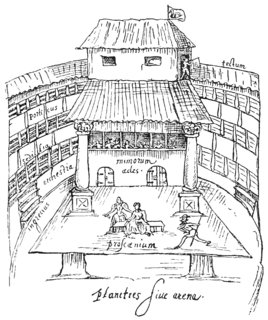William Rowley was an English Jacobean dramatist, best known for works written in collaboration with more successful writers. His date of birth is estimated to have been c. 1585; he was buried on 11 February 1626 in the graveyard of St James's, Clerkenwell in north London.

Richard Brome ; was an English dramatist of the Caroline era.
William Beeston was a 17th-century actor and theatre manager, the son and successor to the more famous Christopher Beeston.
Beeston's Boys was the popular and colloquial name of The King and Queen's Young Company, a troupe of boy actors of the Caroline period, active mainly in the years 1637–1642.
Prince Charles's Men was a playing company or troupe of actors in Jacobean and Caroline England.
The King's Revels Men or King's Revels Company was a playing company or troupe of actors in seventeenth-century England. In the confusing theatre nomenclature of that era, it is sometimes called the second King's Revels Company, to distinguish it from an earlier troupe with the same title that was active in the 1607-9 period. Since the earlier group was a company of boy actors, they are alternatively referred to as the King's Revels Children, while the later troupe is termed the King's Revels Men.
Andrew Pennycuicke was a mid-seventeenth-century actor and publisher; he was responsible for publishing a number of plays of English Renaissance drama.
John Honyman, also Honeyman, Honiman, Honnyman, or other variants, was an English actor of the Caroline era. He was a member of the King's Men, the most prominent playing company of its era, best known as the company of William Shakespeare and Richard Burbage.
John Thompson was a noted boy player acting women's roles in English Renaissance theatre. He served in the King's Men, the acting troupe formerly of William Shakespeare and Richard Burbage.
Michael Bowyer (1599–1645) was an actor in English Renaissance theatre in the Jacobean and Caroline eras. He spent most of his maturity with Queen Henrietta's Men, but finished his career with the King's Men. With the former company, he was one of "those of principal note," according to James Wright's Historia Histrionica (1699), one of the troupe's "eminent actors."
Richard Gunnell was an actor, playwright, and theatre manager in Jacobean and Caroline era London. He is best remembered for his role in the founding of the Salisbury Court Theatre.
William Robbins, also Robins, Robinson, or Robson, was a prominent comic actor in the Jacobean and Caroline eras. During the English Civil War he was a captain in the Royalist army and was killed during the Siege of Basing House.
Hugh Clark was a prominent English actor of the Caroline era. He worked in both of the main theatre companies of his time, Queen Henrietta's Men and the King's Men.
William Allen was a prominent English actor in the Caroline era. He belonged to both of the most important theatre companies of his generation, Queen Henrietta's Men and the King's Men.
Anthony Turner was a noted English actor in the Caroline era. For most of his career he worked with Queen Henrietta's Men, one of the leading theatre companies of the time.
William Wintershall, also Wintersall or Wintersell, was a noted seventeenth-century English actor. His career spanned the difficult years of mid-century, when English theatres were closed from 1642 to 1660, during the English Civil War and the Interregnum.
Ellis Worth, or Woorth, was a noted English actor in the Jacobean and Caroline eras. He was a leading member of two important companies, Queen Anne's Men and Prince Charles's Men.
Alexander Gough, also Goughe or Goffe, was an English actor in the Caroline era. He started out as a boy player filling female roles; during the period of the English Civil War and the Interregnum (1642–1660) when the theatres were closed and actors out of work, Gough became involved in the publication of plays.





